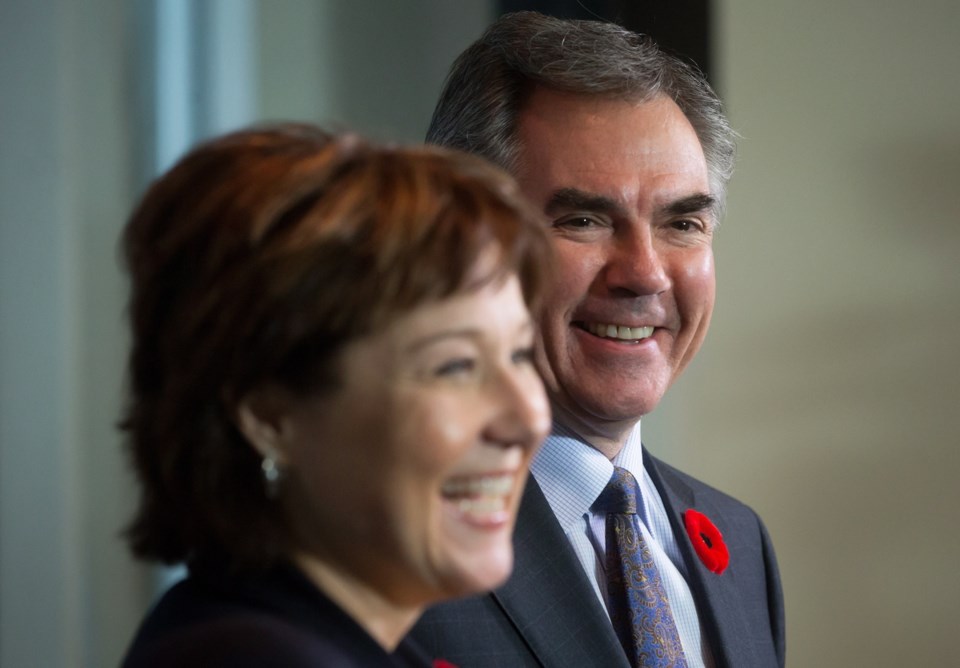 Premier Christy Clark is a naturally voluble political junkie and a former talk-show host, so the position she took during the federal election campaign wasn’t a natural one, and didn’t come easy.
Premier Christy Clark is a naturally voluble political junkie and a former talk-show host, so the position she took during the federal election campaign wasn’t a natural one, and didn’t come easy.
She kept her mouth shut about it, for 78 long days. The temptation to pop off must have been overwhelming at times, given all the topics that came up.
But it paid off Monday night. Justin Trudeau, discounted heavily at the outset, emerged in the past few weeks as a front-runner and capped it with a shockingly big victory.
So as Clark jostles with nine other premiers to start building a working relationship with the new boss, she does so with a clean slate. It’s quite the contrast from last spring, when she casually endorsed Jim Prentice for premier of Alberta, only to see him blunder his way into a huge defeat. That left her in an awkward position while trying to make nice with the winner, NDP Premier Rachel Notley, leader of B.C.’s closest and most important partner province.
Lesson learned.
B.C.’s only position during the campaign was that the softwood-lumber agreement has to be Job One for the new prime minister. Too soon to say how a new Liberal government will handle the resumption of hostilities in that war. But there wasn’t much inspired generalship last time they tackled it.
Then-PM Jean Chrétien presided over an earlier truce with the U.S. about importing Canadian lumber. A B.C. lumber executive equated the Liberal government then to Neville Chamberlain, when it comes to appeasement.
“By kissing the backsides of a few big U.S. timber companies, all we are doing is enhancing their political power in Washington,” said Tom Stephens, then boss of MacMillan Bloedel. He said the U.S. side was astonished when Canada voluntarily agreed to limit imports during that round. It’s remarkable that 20 years have passed and softwood lumber is still the top priority.
Jobs Two and Three are liquefied natural gas and pipelines. Trudeau opposes the Northern Gateway line, is non-committal on the Trans Mountain one and cautiously supportive of LNG. There’s no disconnect there, as B.C. is officially non-committal on pipelines and wildly enthusiastic on LNG.
Locally, what hangs in the balance is the McKenzie Avenue interchange. No worries there. Trudeau likes infrastructure spending even more than the Conservatives did.
On a personal level, Clark is probably delighted with the win. She had a working relationship with Prime Minister Stephen Harper, but her family history is with the Liberals. Her father ran for them three times in the 1960s and 1970s and lost. She worked for the federal Liberals as a youth organizer in Ottawa in the early 1990s.
Behind Clark, the Liberal caucus likely has mixed feelings. By rough estimate, about half of them are federal Conservatives, so to that group the result goes down as a loss.
But it’s vastly overshadowed by the other Monday night result — the collapse of the NDP, which the B.C. Liberals will unanimously see as a huge win. Their sworn enemies lost 68 seats and official Opposition status in the national count as the Layton bubble popped in Quebec. More pertinently, the NDP just barely hung on to their dozen or so seats in B.C. And the long campaign started a series of vicious arguments between the NDP and the Greens, which will likely transfer to the provincial arena, much to the B.C. Liberals’ delight.
The B.C. government also has a lot more B.C. Liberal MPs to get to know. Clark met Trudeau several months ago when he was the leader of the third party in the House of Commons that had two B.C. seats. Next time they meet, he’ll be prime minister of a government that has about 19 seats in B.C.
The last time the Liberal Party got a majority of the seats (16) in B.C. was 1968, which makes for some nice symmetry. It took 47 years for the son to pull off what his old man did.
Get used to the phrase: “Like father, like son.”



